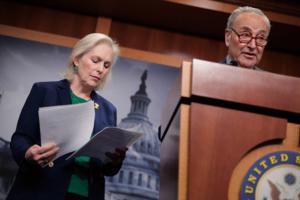Current News
/ArcaMax

Veterans could fill crucial holes in offshore wind workforce
Service members looking to leave the military could fill an important space in their workforce, according to offshore wind labor leaders and developers.
With more offshore wind units coming online over the next few years, more trade jobs will be necessary, according to a 2024 report from the Office of Energy Efficiency and Renewable Energy. The...Read more
Alaska child care advocates urge the Legislature to keep $14M in budget for sector in crisis
Child care advocates are urging the Alaska Legislature to include at least $14 million in this year's budget to help stabilize a sector in crisis.
Last month, the House passed its version of the operating budget with $7.7 million in grants for child care providers and $6.1 million in child care subsidies for families. The Senate's current draft...Read more

Missouri bus crash into ditch injures at least 32 people
At least 32 people were injured Saturday after a commercial bus crashed into a ditch about 70 miles west of St. Louis, Missouri, according to authorities.
The bus was traveling along Missouri Highway 100 west of Hermann when the driver veered off the road to the right, Missouri State Highway Patrol said in a crash report. The driver then ...Read more

Romania's far-right leader to face centrist mayor in runoff
A Romanian ultranationalist aligned with Donald Trump will head to a presidential runoff against the centrist mayor of Bucharest later this month after securing victory in a repeat election on Sunday, the latest blow to the nation’s ruling establishment.
George Simion of the ultranationalist Alliance for the Union of Romanians secured 40%, ...Read more

Adams says 500 NYC bodegas will get silent panic buttons in $1.6M initiative
The city is planning to put panic buttons linked to the NYPD in about 500 bodegas across the five boroughs, the mayor and police commissioner announced Sunday.
Mayor Adams and NYPD Commissioner Jessica Tisch said the city will allocate $1.6 million through an emergency grant to the United Bodegas of America, as part of the city budget, to equip...Read more

Trump on due process: 'I don't know'
President Donald Trump has twice been sworn in to do the job of leading the country with his vow to uphold the Constitution, but on Sunday he expressed uncertainty about whether or not that included “due process.”
During a wide ranging interview aired Sunday on NBC’s Meet the Press with Kristen Welker, Trump didn’t have an answer when ...Read more

With Illinois' grocery tax set to end, many municipalities are adopting their own, even as food prices climb
Voters in Bensenville, Illinois, recently made clear how they felt about a proposed 1% tax on groceries. In a referendum on April 1, 91% voted against it.
Even though the measure failed in Bensenville, at least 163 communities around the state have recently enacted local grocery taxes.
Gov. JB Pritzker signed a bill last year repealing the ...Read more

Romania far-right leader scores first-round election win
A far-right Romanian opposition leader who aligned himself with Donald Trump secured a first-round victory in a repeat presidential election, dealing a blow to the Black Sea nation’s ruling establishment amid outrage over persistent corruption and poverty.
George Simion of the ultranationalist Alliance for the Union of Romanians secured 40.2...Read more

More Georgia families are choosing to homeschool
Katrina Roman’s four Spanish students are slowly walking around their small classroom looking for something. These students, in grades K-12, don’t know what they’re searching for, but Roman prompts them by telling them if they are getting warm (“calor”) or cold (“frio”).
“Mucho frio (very cold), hace mucho frio (you’re very ...Read more

N.Y. Sen. Schumer slams Trump, RFK Jr. for 'just lying' about layoffs threatening 9/11 health program
The Trump administration’s funding shell game over the health program that treats 9/11 first responders with Ground Zero-related illnesses continued this weekend with a fresh round of layoffs — and New York’s Senate delegation is calling on their Republican colleagues to step up and save the program.
Friday’s mass layoffs at the ...Read more

Romania far-right leader wins first- round vote, poll shows
Romania’s far-right opposition leader won the first round of a presidential election repeat as voters took aim at the ruling establishment over persistent corruption and poverty in the Black Sea nation, exit polls showed.
George Simion of the ultranationalist Alliance of the Union of Romanians secured 30%, according to exit polls released by...Read more

Minn. woman's fight to renew her 92-year-old mother's Medicaid highlights the growing problem of short-staffed counties
Twenty-two voicemails.
That’s how many Vickie Schaefer left during a five-day stretch, trying to get someone at Hennepin County, Minnesota, to help her renew the financial assistance her 92-year-old mother relies on to pay rent at her assisted living facility.
Eventually, the Plymouth woman reached someone — on call 23 — but she worries ...Read more
5.4-magnitude quake, aftershocks rattle West Texas, seismologists say
A 5.4-magnitude earthquake shook the West Texas area just south of the New Mexico border, the U.S. Geological Survey reported.
The nearly 5-mile-deep quake hit west of Pecos, about 35 miles south of Whites City, New Mexico, at 7:47 p.m. on Saturday, May 3, according to the USGS.
More than 1,600 people from as far away as Hemet, California, and...Read more

With the state's grocery tax set to end, many municipalities are adopting their own, even as food prices climb
Voters in Bensenville, Illinois, recently made clear how they felt about a proposed 1% tax on groceries. In a referendum on April 1, 91% voted against it.
Even though the measure failed in Bensenville, at least 163 communities around the state have recently enacted local grocery taxes.
Gov. JB Pritzker signed a bill last year repealing the ...Read more

Trump signals willingness to lower China tariffs 'at some point'
President Donald Trump said he is willing to lower tariffs on China at some point because the levies now are so high that the world’s two largest economies have essentially stopped doing business with each other.
Trump has placed tariffs as high as 145% on Chinese imports. China has retaliated with tariffs of 125% on American imports. The ...Read more

NY Sens. Schumer, Gillibrand call for GOP lawmakers to step up after Trump layoffs threaten 9/11 health program
The Trump Administration’s funding shell game over the health program that treats 9/11 first responders with Ground Zero-related illnesses continued this weekend with a fresh round of layoffs — and New York’s Senate delegation is calling on their Republican colleagues to step up and save the program.
Friday’s mass layoffs at the ...Read more

1 person killed, at least 13 wounded in shooting at Houston party
One person was killed and at least 13 more wounded in a mass shooting at a family barbecue in Houston early Sunday morning, police said.
None of the victims has been publicly identified, and officials said Sunday they did not know the ages of all the victims.
Cops detained multiple people at the scene on Houston’s southeast side, but ...Read more

Survey: Georgia OB-GYNs say state abortion law risks mothers' health
A survey of 38 of Georgia’s OB-GYNs found that nearly half of doctors participating said they have personally encountered cases where care had to be delayed, causing death or health complications for the mother, as a result of ambiguity in the state’s abortion law.
The survey, done by the American College of Obstetrics and Gynecology in ...Read more

Czechs lead talks on ammunition supplies for Ukraine into 2026
Czechs are leading talks on continuing deliveries of heavy ammunition for Ukraine stretching into 2026, said President Petr Pavel.
The Czech leader, speaking after meeting Ukrainian President Volodymyr Zelenskyy in Prague on Sunday, said the so-called Czech ammunition initiative financed by 11 countries was on track to deliver 1.8 million ...Read more

Israel prepares to scale up pressure on Gaza ahead of Trump visit
Israel’s security cabinet was set to meet on Sunday to approve an expansion of military action in Gaza and discuss aid deliveries ahead of a planned visit to the Middle East this month by President Donald Trump.
The new ground operations will likely involve taking control of additional territory while stopping short of a full siege, ...Read more
Popular Stories
- Trump sparks backlash dressed as pope in AI image shared by White House
- After disasters, FEMA leases apartments for survivors. But not after the LA fires
- Two men in ICE custody died of 'natural' causes. Were their deaths preventable?
- Colorado House passes immigrant protection bill amid new Trump lawsuit against state
- Elon Musk wins vote to establish his own city in Starbase, Texas





